|
De Nederlandse dichter en schrijver Bart Chabot werd geboren in Den Haag op 26 september 1954. Zie ook mijn blog van 26 september 2010 en eveneens alle tags voor Bart Chabot op dit blog.
Bij de ondergrondse
aprilwarmte —dit markeerde het prille begin van de lente
en betekende voor de leden van de ondergrondse
dat het de hoogste tijd was
om tot actie over te gaan
op de kerkhoven en begraafplaatsen van het koninkrijk
krioelden de doden dooreen;
werkelijk overal waren zij gemobiliseerd
en van heinde en verre opgetrommeld —
vele handen maakten licht werk
en aan werk was geen gebrek
de sfeer onderling was opgeruimd
om niet te zeggen: levendig
wie goed naar het aardoppervlak keek
kon soms iets zien bewegen,
een signaal dat vlak onder de grond
met man en macht werd doorgewerkt
allerwegen werd het gras zonder pardon
uit de grond gedrukt
bloemen werden omhooggeduwd
en opgestoten in de vaart der volkeren
en stads- en parkbomen kregen het groene licht;
waarop zij hun takken lieten ontbotten
dat de doden zich zonder enige hinder
door materie konden verplaatsen
kwam bij de uitvoering van de werkzaamheden
goed van pas
Milky Way
ik keek omhoog
de nachthemel in
en zag de melkweg,
althans een flink stuk ervan
de melkweg, waar ik zelf
deel van uitmaakte —
een radertje; een van de vele
ik was doordrongen van
een besef van nietigheid
waar ik persoonlijk
heel wel mee uit de voeten kon
beter kijkend viel me op
dat nogal wat sterren me met enigszins
verwijtende blik aanstaarden
ik pijnigde mijn hoofd
wat de reden van hun ergernis
zou kunnen zijn
had ik hen iets misdaan?
bij mijn weten niet —
maar 100% zeker daarvan
was ik niet
tot ik me realiseerde
dat ik hen, tot op heden, niet
of nauwelijks aan bod had laten komen
in mijn gedichten
het was waar: de melkweg
c.q. de individuele sterren
hadden mijn poëzie
tot nog toe niet gehaald;
niets onoverkomelijks
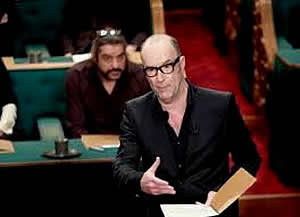
Bart Chabot (Den Haag, 26 september 1954)
De Engels-Amerikaanse dichter en schrijver T. S. Eliot werd op 26 september 1888 geboren in St.Louis, Missouri. Zie ook mijn blog van 26 september 2010 en eveneens alle tags voor T. S. Eliot op dit blog.
Rhapsody On A Windy Night (Fragment)
Half-past three,
The lamp sputtered,
The lamp muttered in the dark.
The lamp hummed:
"Regard the moon,
La lune ne garde aucune rancune,
She winks a feeble eye,
She smiles into corners.
She smoothes the hair of the grass.
The moon has lost her memory.
A washed-out smallpox cracks her face,
Her hand twists a paper rose,
That smells of dust and old Cologne,
She is alone
With all the old nocturnal smells
That cross and cross across her brain."
The reminiscence comes
Of sunless dry geraniums
And dust in crevices,
Smells of chestnuts in the streets,
And female smells in shuttered rooms,
And cigarettes in corridors
And cocktail smells in bars."
The lamp said,
"Four o'clock,
Here is the number on the door.
Memory!
You have the key,
The little lamp spreads a ring on the stair,
Mount.
The bed is open; the tooth-brush hangs on the wall,
Put your shoes at the door, sleep, prepare for life."
The last twist of the knife.
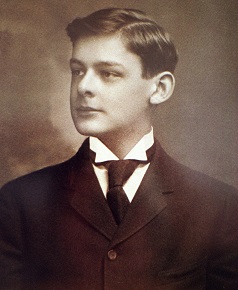
T. S. Eliot (26 september 1888 – 4 januari 1965)
T. S. Eliot op jeugdige leeftijd
De Nederlandse schrijver Thomas van Aalten werd geboren in Huissen bij Arnhem op 26 september 1978. Zie ook alle tags voor Thomas van Aalten op dit blog.
Uit:Henry!
“In de coupé zat ik tegenover een jonge vrouw die gekleed was in een eigeelkleurig jurkje. Ze droeg haar haar als Audrey Hepburn op de recente cover van Harper’s Bazaar. Er stond een mintgroen koffertje op haar schoot, waar maar weinig bagage in zou passen. Aan het koffertje hing een label met een Frans klinkende naam: Coco Dolores.
‘Parlez-vous français, madame?’ vroeg ik.
‘Oui.’
‘Vous connaissez Harper’s Bazaar?’
Ze schudde haar hoofd en vroeg waarom ik dat wilde weten. Ik overhandigde haar het blad en zei dat ik het een paar dagen ervoor in Amsterdam gekocht had.
De jonge vrouw glimlachte terwijl ze het doorbladerde. Ze rook vagelijk naar ontsmettingsmiddel. ‘U komt dus uit Amsterdam? Ik ben een Vlaamse. Ik spreek Nederlands.’
‘Aha, waar komt u vandaan, als ik vragen mag?’ vroeg ik.
‘Antwerpen.’
‘En, wat vindt u van het blad? U zou volgens mij tot de doelgroep horen. Studeert u?’
‘Studeren? Ik ken maar weinig vrouwen die studeren. Ik ben getrouwd met een bankier.’
‘Ik wil eigenlijk weten: kan dit blad populair worden in Nederland of België, denkt u?’
‘Waarom wilt u dat weten?’
‘Gewoon, interesse.’
‘Bent u verkoper?’
‘Nee. Ik werk voor een stadskrant in Amsterdam. Journalist.’
‘En bent u op reis voor uw werk?’
‘Inderdaad, ik kom net terug van een interview. Er was iemand verongelukt in Zwitserland, een Nederlandse student. Ik heb zijn moeder gesproken. Ook stadskranten zijn op zoek naar originele verhalen…’
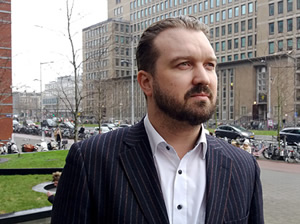
Thomas van Aalten (Huissen, 26 september 1978)
De Nederlandse schrijver en muzikant Jerry Hormone (pseudoniem van Jeroen Aalbers) werd geboren in Numansdorp op 26 september 1982. Zie ook alle tags voor Jerry Hormone op dit blog.
Uit: De spareribclub
“Zaterdag was onze vaste dag. Na het golfen bleven we altijd nog wat borrelen in het clubhuis. Ze hadden een aardige keuken, maar de spareribs waren er niet te vreten, vond Van Aalst. `Dat je dat binnen kan houden,' zei Van Aalst tegen Dirk. `Wat is er mis mee dan?' vroeg Dirk en hij zoog op een bot. `Het zijn voorgegrilde uit de vriezer die ze zonder ze te ontdooien in de frituurpan pleuren.' Van Aalst trok het bord spareribs onder Dirk z'n neus vandaan en smeet het in de prullenbak. `Wat doe jij nou?' `Ik zal jullie eens échte spareribs laten proeven. Ik weet een tentje in Zuid-Beijerland waar ze ongelooflijk lekker zijn. En onbeperkt voor maar twintig gulden.' We goten de vaasjes Heineken achterover. Gooiden de golftas over de schouder en liepen naar onze auto's. We hadden al aardig wat gedronken, maar dat had ons er nog nooit van weerhouden te rijden. 'Als je nog kan zitten, kan je nog rijden,' zei Arie altijd. We reden achter Van Aalst over de Molendijk naar Zuid-Beijerland, het dorp ten westen van Numansdorp. Parkeerden naast de kerk, staken de straat over. `Voilà,' zei Van Aalst. 'Eetcafé 't Zwaard.' Binnen was het meer bruine kroeg dan eetcafé. `Klaas!' riep Van Aalst naar de man die achter de bar wijnglazen stond te poleren. 'Vier vaasjes en vier keer onbeperkt spareribs met alles erop en eraan!' We gingen aan een tafel onder een door de motten aangevreten hertenkop zitten. Klaas kwam met de biertjes.
`Zeg tegen je vrouw dat ze flink opschept,' zei Van Aalst. IJ kan altijd bijbestellen,' zei Klaas met plat Hoeksche Waards accent. Hoeksche Waarders hadden een hekel aan import. Zeker aan dat volk uit de grote stad, met hun grote bekken en hun opgedofte wijven. Maar voor onze centen haalden ze hun boerenneuzen niet op. Daar zeiden ze zelfs `u' voor. `Die Klaas z'n vrouw is een partijtje lelijk,' zei Van Aalst zonder te kijken of Klaas al ver genoeg was om het niet te kunnen horen, 'maar d'r spareribs zijn waanzinnig.' `Waar ligt het 'm aan?' vroeg Arie. 'De kwaliteit van het vlees?' `Ook,' zei Van Aalst. 'Maar het is vooral de marinade. Zo pittig en zo zoet.' `Wat zit erin dan?' vroeg ik. `Geheim recept,' zei Van Aalst. `Ze steekt ze voor het bakken zeker eerst effe in d'r kut,' zei Arie.”
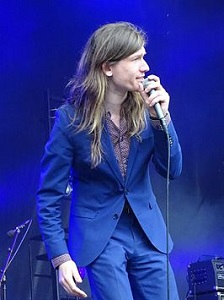
Jerry Hormone (Numansdorp, 26 september 1982)
De Braziliaanse schrijver Luís Fernando Veríssimo werd geboren op 26 september 1936 in Porto Alegre, Rio Grande do Sul. Zie ook alle tags voor Luís Fernando Veríssimo op dit blog.
Uit:Borges and the Eternal Orangutans (Vertaald door Jull Costa)
“He rushes out, perhaps after stabbing Rotkopf a third time, and goes to his room, closing the door only seconds before I get out of the lift. He deans the murder weapon and throws it out of the bathroom window." "Before that," you continued, "Urquiza had given up knocking on Johnson's door and also returned to his own room. The following day, when he finds out about Rotkopf's murder, he decides, just in case, to throw his knife out of the bathroom window" "All right," said Cuervo, clutching his head. "We've explained two of the knives. What about the third?" Jorge and I were unanimous in our silence. "And how did Johnson manage to leave the room without unlocking the door?" insisted Cuervo. We continued in silence. Until you, trying, out of respect for Cuervo's distress, not to sound ironic, said: "Well, there are still a few details to be worked out . . ."
I asked what you meant about too much symmetry. You revealed that you also had some news. Taking advantage of your previous night's insomnia, you had been rummaging around in the depths of your memory for everything you knew about the Necronomicon, and about your researches into John Dee. You had remembered that the power of the magical beings, of the dead names, was shared out amongst the quadrants of the Earth, and that the most powerful beings were Azathoth andYog-Sothoth, from the Southern quadrant, the king and the prince of chaos, the only ones who could call up Hastur, he who walked in the wind, the destroyer. You had a vague idea that something linked Hastur to the case in hand and finally, as the night was ending, you remembered what it was: in the contents page of the translation of the Necronomicon that Lovecraft attrib-uted to John Dee, the chapter on Hastur was number ten. The X that Rotkopf had made in the mirror. The number to card that accompanied the prince and the king of the pack. And surely we remembered that sudden wind on the night of the crime.
If your intention had been to irritate Cuervo still further, you succeeded. He was standing up. "Do you mean to say that the murderer isn't Johnson now, but Hastur, a malign spirit?" "At least that solves the problem of the locked room. After all, spirits can walk through walls," I said provoca-tively. "Or perhaps Johnson was the embodiment of Hastur, since he had presumably deciphered all the spells in the Necronomicon," you added. "Can we be serious for a moment?"
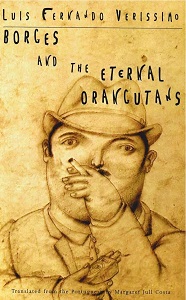
Luís Fernando Veríssimo (Porto Alegre, 26 september 1936)
Cover
De Engelse schrijver Mark Haddon werd geboren op 26 september 1962 in Northampton. Zie ook alle tags voor Mark Haddon op dit blog.
Uit:A Spot of Bother
“It began when George was trying on a black suit in Allders the week before Bob Green's funeral.
It was not the prospect of the funeral that had unsettled him. Nor Bob dying. To be honest he had always found Bob's locker-room bonhomie slightly tiring and he was secretly relieved that they would not be playing squash again. Moreover, the manner in which Bob had died (a heart attack while watching the Boat Race on television) was oddly reassuring. Susan had come back from her sister's and found him lying on his back in the center of the room with one hand over his eyes, looking so peaceful she thought initially that he was taking a nap.
It would have been painful, obviously. But one could cope with pain. And the endorphins would have kicked in soon enough, followed by that sensation of one's life rushing before one's eyes which George himself had experienced several years ago when he had fallen from a stepladder, broken his elbow on the rockery and passed out, a sensation which he remembered as being not unpleasant (a view from the Tamar Bridge in Plymouth had figured prominently for some reason). The same probably went for that tunnel of bright light as the eyes died, given the number of people who heard the angels calling them home and woke to find a junior doctor standing over them with a defibrillator.
Then . . . nothing. It would have been over.
It was too early, of course. Bob was sixty-one. And it was going to be hard for Susan and the boys, even if Susan did blossom now that she was able to finish her own sentences. But all in all it seemed a good way to go.
No, it was the lesion which had thrown him.
He had removed his trousers and was putting on the bottom half of the suit when he noticed a small oval of puffed flesh on his hip, darker than the surrounding skin and flaking slightly. His stomach rose and he was forced to swallow a small amount of vomit which appeared at the back of his mouth.
He had not felt like this since John Zinewski's Fireball had capsized several years ago and he had found himself trapped underwater with his ankle knotted in a loop of rope. But that had lasted for three or four seconds at most. And this time there was no one to help him right the boat.”
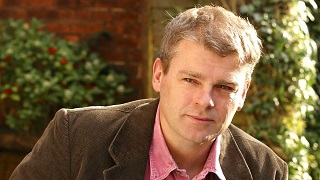
Mark Haddon (Northampton, 26 september 1962)
De Engelse schrijver, criticus en columnist William Self werd geboren in Londen op 26 september 1961. Zie ook alle tags voor William Self op dit blog en ook mijn blog van 26 september 2010.
Uit: Cock And Bull
“Carol had always felt at some level less of 3 woman when Dan was around. Not that she ever would have defined what she felt in these terms — and she certainly wouldn't have used this particular language. Carol had completed one third of the degree course in sociology at Llanstephan, a small.. dull Welsh college. Her tertiary education was brief. She was exposed to enough of the student radicalism that was then in fashion to have been able to attach to her feeling; of alienation from Dan neat tags of feminist jargon — but Carol was too insipid to shape her critique. So while men weren't necessarily stupid or chauvinistic, neither were they 'phallocentric' or 'empowered by the male phallic hegemony'. And women, on the other hand, they weren't depressed, oh no. And neither were they 'alie-nated'. Of them, never let it be said that their 'discourse was vitiated'. Carol had spent long. sapphic nights at Llanstephan under the influence of a rotund lesbian called Beverley, who hailed from Leeds. Beverley lectured her on the jargon, attempting to move her from the casting couch to a speaking part in the cod philosophy. They grew tense on instant coffee and eventually fiddled sweatily with the toggles of each other's regulation bib 'n' braces. But despite these relatively exotic experiences, Carol, the daughter of a desperately self-efllicing woman and a dissatisfied autodidactic electrical cnginccr from Poole, was not impelled into an original lifestyle, or even inclined to complete her degree in order to counter the masculine cultural hegemony. Beverley's sour-crcam flesh and probing digits failed to release whatever lode of sexual ecstasy Carol might have had locked within her narrow bosom — as did the blind-mole bumping of the seven or so penises that had trailed up her thin thighs since she started going in for that sort of thing. This was left to Dan to achieve — by a fluke, entirely. And it was this fluke, combined with Carol's tendency always, always to take the line of least resistance, in all that she ever said, or did, or even thought, that gives this story its peculiar combination of cock and bull. A pub-crawl down the snaking high street of a Warwickshire market town, this was the prelude to the chain of chance. In the manner of students the world over, Carol had departed from Uanstephan with two colleagues, one of whom she knew only vaguely. The vague one, in turn, had a still vaguer acquaintance with some design students at Stourbridge. A party was in the offing. The three lianstephanites, Carol, a girl called Bea, and the boy, Alun, set off at dusk in a borrowed car and burrowed across Wales and then through night-time England in the narrow tunnel carved by the headlights.”
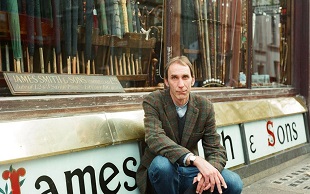
William Self (Londen, 26 september 1961)
De Amerikaanse schrijfster Jane Smiley werd geboren op 26 september 1949 in Los Angeles. Zie ook alle tags voor Jane Smiley op dit blog en ook mijn blog van 26 september 2010
Uit: Some Luck
“Stella, who had been sleeping in her basket in the corner, leapt up barking and then slipped out the bedroom door. Margaret heard her race down the stairs. It was early; fog still pressed against the two bedroom windows.
Margaret sat up, but then she lay back on her pillow, dejected—she must have missed a telegram, and now her husband, Andrew, had returned. She woke up a bit more and listened for the opening of the front door. But, no, there hadn’t been a telegram—she remembered that she’d looked for one. Had she not locked the front door? She stilled her breathing and listened. With the war on, all sorts of characters crammed Vallejo these days. Suddenly a little frightened, she slid out of bed and stealthily pulled on her robe, then opened the door of her room a bit wider and crept out far enough to peer over the banister. There was the top of a head, dark, not Andrew’s, and by the dull light of the hall windows, a houndstooth jacket. A figure bent over to pet Stella, and Stella wagged her tail. This was reassuring. Margaret took a deep breath. Now the figure stood up, looked up, and smiled. He said, Put your clothes on, darling, we’re going for a ride.
She was speechless with pleasure at seeing Pete, though he seemed to have walked right in—did that mean she had left the door unlocked, because how would he get a key? But getting ready took her no time, she made sure of that. She only brushed out her hair and redid her bun so that some of the gray was hidden, then got out her best blue suit with the white piqué collar and her last pair of hose and her nicest shoes. She put on the black straw hat with a half-veil, and she looked neat, she thought, though no better than that—at her age, you could not hope to look pretty, and she had never been beautiful.”
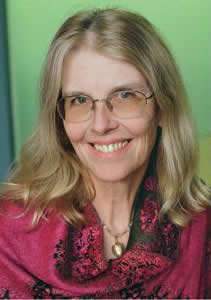
Jane Smiley (Los Angeles, 26 september 1949)
De Russische schrijver en dissident Vladimir Nikolajevitsj Vojnovitsj werd geboren in Doesjanbe op 26 september 1932. Zie ook alle tags voor Vladimir Vojnovitsj op dit blogen ook mijn blog van 26 september 2010.
Uit: Monumental Propaganda (Vertaald door Andrew Bromfield)
“Of course, that was demagoguery. Livshits undoubtedly knew, as everyone knew-only one did not say it out loud-that the economic situation would only be easy under communism. Well then, were we supposed to just sit back and not build anything, neither saw nor sew nor plane nor forge nor sculpt until the advent of communism? Perhaps that was what the rootless and tribeless cosmopolitan Livshits was counting on? But he had miscalculated. Soon thereafter he had been exposed as involved with the international organization of Zionists and spies known as Joint and suffered the well-deserved penalty. In the quiet hour before dawn one of the automobiles popularly known as a "black raven" or "black Marusya" had pulled up at the Livshits' house and removed the self-appointed representative of the people to a place far distant from the city of Dolgov.
Livshits was not alone. Others may have expressed their opinions less openly, but they had also dropped hints.
Having overcome the resistance, Aglaya had her way and erected the monument-although it wasn't actually bronze, as had been anticipated at the beginning, but cast iron. Because the railway wagon with the bronze, having left the city of Yuzhnouralsk one fine day, never arrived at the city of Dolgov. (Where it did arrive remains a mystery even now.) This delighted certain spiteful faultfinders. Perhaps it also delighted Wilhelm Leopoldovich Livshits as he squatted on his prison toilet, but his delight was premature. Aglaya's enemies knew her well, but not well enough. They had underestimated her will to victory and failed to appreciate that she never retreated from her chosen goal. She went to Moscow, consulted the sculptor Max Ogorodov and commissioned him to forge the statue out of cast iron."
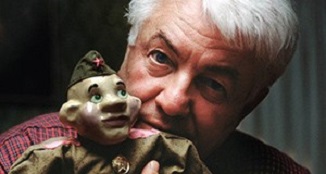
Vladimir Vojnovitsj (Doesjanbe, 26 september 1932)
Zie voor nog meer schrijvers van de 26e september ook mijn blog van 26 september 2015 deel 2.
26-09-2017 om 18:29
geschreven door Romenu 
Tags:Bart Chabot, T. S. Eliot, Thomas van Aalten, Luís Fernando Veríssimo, Mark Haddon, William Self, Jane Smiley, Vladimir Vojnovitsj, Romenu
|

